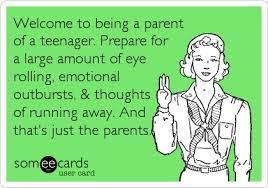We teach our children so many things over the years: how to hold a cup, tie a shoe, ride a bike or share a toy are all building blocks to the future. Learning tasks at an early age prepares children for the big, bright future, right?
Right. But, as we all know, being a parent is a lifelong job. And being a parent of a teen is an Olympic feat. Dealing with the heavy sighs alone should deem each and every one of us worthy of a gold medal. The Olympic Committee has yet to respond to me on this novel idea, but I will keep trying. Promise.
Teaching children, including those eye rolling teens, is just part of the gig. Unfortunately, we often forget that teaching them how to be effective communicators is a key ingredient to their future endeavors. We get so busy teaching them how to drive, how to conjugate French verbs, and how to NOT put the empty milk container back into the refrigerator that we forget to enlighten them on how to effectively initiate a dialogue, make an introduction, or extricate themselves from an unseemly conversation.
By coaching your teen on some basic communication skills you are giving them a gift. After all, you wouldn't send your child out into the snow without a coat, so why send them off to college or a job interview without ALL of the tools they need to not only survive, but also thrive?
Rest assured, I've been a parent (and step-parent) to many a teen, so I realize trying to "teach" them anything will cause them to huff and sigh themselves into hyperventilation. Keep spontaneous "learning opportunities" short and to the point, so you keep your teen's attention for longer than a nanosecond.
Here are three straightforward tips to start a conversation, keep the dialogue going, and gracefully end an exchange:
Get In
Everything starts at the beginning, but getting started at the beginning is tough! Walking into a room full of strangers can be scary, even for the savviest small talker. Remind your teen that everyone feels this way, but by being prepared (and a teeny bit brave), you're likely to succeed.
- Have three interesting topics (sports, music, current events, cultural happenings) in mind before walking in a room. Usually the other person does not have a topic in mind, so you're doing him, and you, a favor by putting something -- anything -- out on the table.
- Stand up straight, smile, and breathe. Breathing helps. Really.
- Offer direct eye contact and a handshake when appropriate -- others are drawn to those who appear confident and happy.
Get Going
Once your teen is in a conversation, it's necessary to keep it going. Use the acronym TALK as a cheat sheet for success:
T = TRY - Try a compliment -- your speech last week was funny. Nice job!
A = ASK - Ask a question -- how did you do on the final?
L = LISTEN - Listen well -- Spending more time listening than talking is, truly, the secret to successful communication. By actually listening well instead of formulating your next statement, a conversation partner will offer you clues and insight you're your teen can then follow-up on later. For example, if someone says: I have got to find a summer job before the end of the month or my parents are going to flip your teen can respond in kind with: I hear you. Where have you looked so far? I'm going to a job fair this weekend. Want to come?
K = KEEP - Keep the surroundings in focus. If your teen is at a party and notices someone wearing a college sweatshirt, he can use this as a launch pad: I saw the Notre Dame home game last week; the campus looks amazing. Have you been?
Get Out
All good things must come to an end, even a sparkling conversation. I've seen way too many adults skulk off like petty thieves when a conversation comes to a natural standstill.
Help your teen resist the urge to fade into the background and, instead, politely end a conversation. Something as simple as: It was great connecting with you or Thanks for the joke -- I am going to use it! will work. It lets the person know that the conversation was meaningful and appreciated.
Once your teen masters the fine art of small talk, it will be a skill they will use forever -- just like riding a bike.

